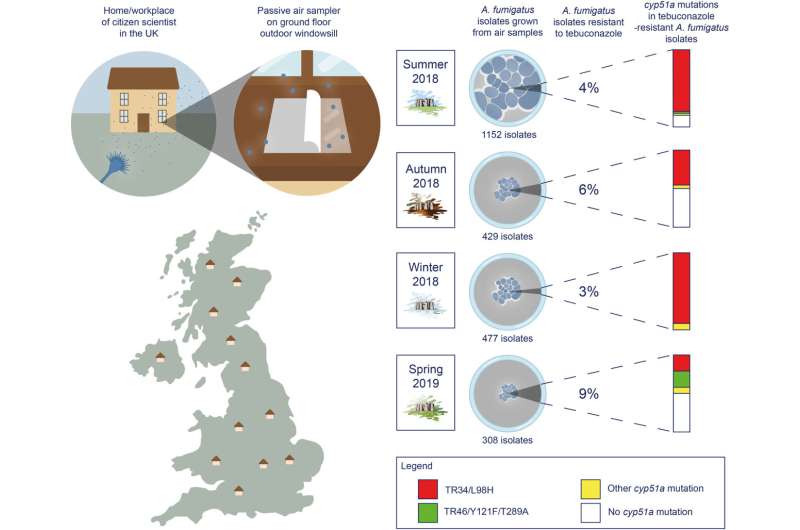This article has been reviewed according to Science X's editorial process and policies. Editors have highlighted the following attributes while ensuring the content's credibility:
fact-checked
peer-reviewed publication
trusted source
proofread
Citizen science shows widespread exposure to drug-resistant fungal spores

Fungal pathogen Aspergillus fumigatus has acquired resistance to agricultural fungicide and first-line clinical antifungal drugs.
Aspergillus fumigatus is a fungus which plays a key role in the break down of plant and soil organic matter. But exposure to this mold can cause a chronic and acute life-threatening disease in humans, called aspergillosis.
New work published in the journal Science Advances by Dr. Jennifer Shelton and team focused on Aspergillus fumigatus and drug resistance using a unique approach working with the general public to conduct research.
During the northern hemisphere seasonal equinoxes and solstices of 2018 and 2019, citizen scientists across the U.K. collected air samples.
Aspergillus fumigatus isolates were cultured in half of the 1,900 samples that were send back.
Further analysis of these isolates showed that one in 20 spores we inhale were resistant to an agricultural fungicide called tebuconazole.
This fungicide is the third most used azole in agriculture and is an indicator of the fungi developing resistance to medical drugs used to treat aspergillosis.
An individual in the U.K. is exposed to drug-resistant Aspergillus fumigatus spores for 22 days per year according to calculations presented in the report.
Dr. Jennifer Shelton, Molecular Ecologist at UK Center for Ecology & Hydrology said, "We set out to determine the levels of azole-resistance in Aspergillus fumigatus spores circulating in UK air and could not have achieved this without the contribution of our citizen scientist volunteers.
"Once we understand the scale of the problem we can begin to mitigate it and help those most at-risk of developing aspergillosis to reduce their exposures."
Prof. Mat Fisher, Fisher Lab at the MRC Center for Global Infectious Disease Analysis said, "Fungal infections are often neglected, yet cause a global public health burden. The worsening problem of resistance to antifungal drugs needs urgent attention if we are to continue to protect those that are at risk from fungal disease."
More information: Jennifer M. G. Shelton et al, Citizen science reveals landscape-scale exposures to multiazole-resistant Aspergillus fumigatus bioaerosols, Science Advances (2023). DOI: 10.1126/sciadv.adh8839




















